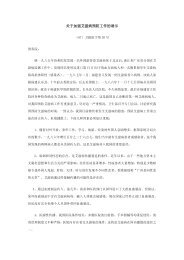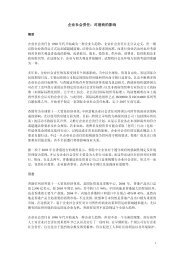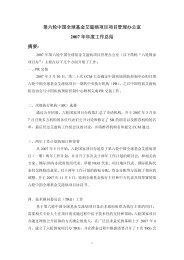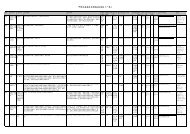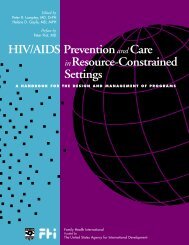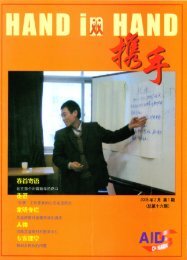The Training of Trainers Manual - UNFPA
The Training of Trainers Manual - UNFPA
The Training of Trainers Manual - UNFPA
Create successful ePaper yourself
Turn your PDF publications into a flip-book with our unique Google optimized e-Paper software.
Stress and self-care<br />
Peer educators may feel especially dedicated to their work because <strong>of</strong> the severity <strong>of</strong> the<br />
repercussions <strong>of</strong> HIV/AIDS, especially those in high-prevalence countries and those who work with<br />
vulnerable groups. However, even when working in low-prevalence countries and with generalpopulation<br />
youth, trainers and peer educators experience stress from the competing demands <strong>of</strong><br />
work, home, and school.<br />
Stress is physical, mental, or emotional pressure caused by overworking the body or mind. It can<br />
lead to physical and emotional symptoms. Common symptoms include:<br />
▼ Pain (headaches or backaches)<br />
▼ Changes in feelings (such as anger or sadness)<br />
▼ Changes in eating habits (overeating or undereating)<br />
▼ Social retreating (wanting to be alone)<br />
▼ Changes in sleeping habits (insomnia or sleeping too much)<br />
▼ Loss <strong>of</strong> concentration (restlessness)<br />
A few symptoms <strong>of</strong> stress might be considered normal or fairly common for motivated and committed<br />
individuals. But stress can be limited by positive peer support and a commitment to inform trainers<br />
and peer educators about ways they can care for themselves. In serious cases, stress can lead to<br />
burnout, a serious medical condition. Self-care is a way that individuals can prevent stress from<br />
building up (see Handout 12. Self-Care).<br />
Exercise: Design <strong>of</strong> peer education training<br />
Objective<br />
To discuss various models and strategies for training peer educators<br />
45<br />
minutes<br />
Materials Flip chart paper, markers, and tape<br />
Process<br />
First, explain that there are many different designs for peer educator training<br />
programmes, all with their own advantages and disadvantages. Some programmes<br />
use an intensive training schedule over several full days; others employ shorter,<br />
individual sessions that extend over a period <strong>of</strong> weeks or months.<br />
One successful design <strong>of</strong> a peer educator training programme requires a consistent<br />
commitment by the trainees to one evening <strong>of</strong> training per week throughout<br />
the (academic) calendar. In such a training format, the peer educators can, for<br />
106 <strong>Training</strong> <strong>of</strong> <strong>Trainers</strong> <strong>Manual</strong>



